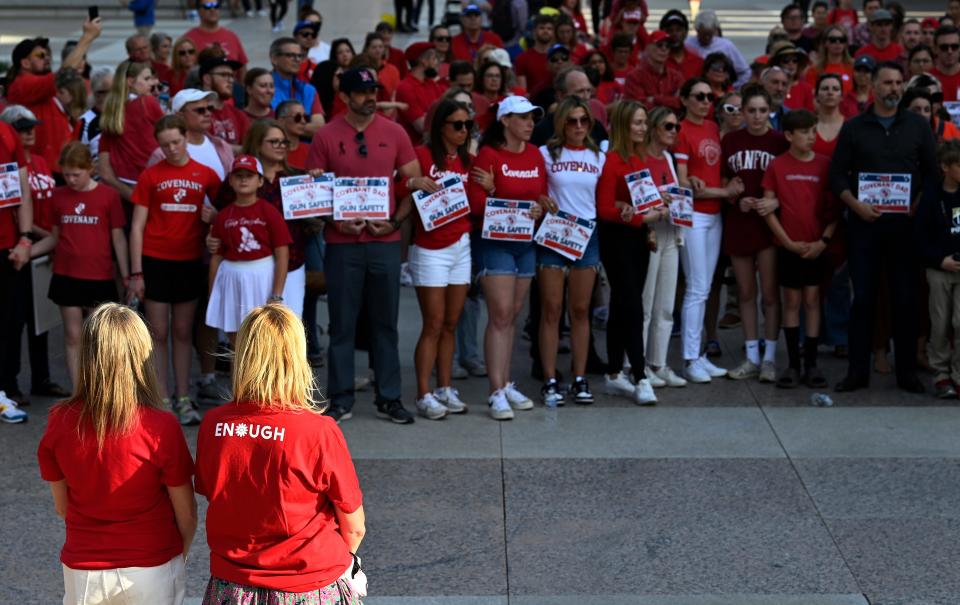Extreme risk laws are popular with Tennesseans and save lives from gun violence | Opinion
On March 27th, our community was shaken. As pediatricians and pediatric healthcare providers, each day we focus on improving outcomes for Tennessee children – sometimes through treating illness and trauma, and other times by preventing it.
We were left helpless on March 27th, unable to save lives – but it does not have to be this way. Firearms are the leading cause of death among U.S. children. How can we stop this? By listening to Tennessee parents.
Even before the horror of the events on March 27th at The Covenant School, Tennessee parents sounded the alarm about how their children were endangered by gun violence in schools. In Fall 2022, we polled Tennessee parents to ask what their biggest concerns were for their children. School-based gun violence was one of their top 5 concerns. More than drugs and alcohol. More than car accidents. More than COVID.
What’s more, two-thirds of parents support key actions the Tennessee legislature could take when it comes to gun violence in schools, including providing school resource officers in all buildings, requiring background checks for all gun sales (including private sales and sales at gun shows), requiring people to store their guns securely, and temporarily restricting a person’s access to a gun through civil court order if that person poses a risk to themselves or others.
Why extreme risk laws are in line with the 2nd Amendment
An extreme risk law, supported by 64% of Tennessee parents, would be a significant step forward to prevent future mass shootings in Tennessee. Parents and loved ones are often the first to realize when a child, sibling, or friend is struggling. For school shootings, like The Covenant School shooting, warning signs are often even more apparent. But all too often, people don’t have the tools to act on these warning signs.
Extreme risk laws provide such a tool and are in line with Tennesseans’ Second Amendment rights. People struggle. This is a fact of life, but we need more tools to put time and space between those who struggle and their access to deadly weapons. Extreme risk laws permit immediate family members or law enforcement to petition a civil court for an order to temporarily remove and prohibit purchase of new firearms. A judge considers key risk factors such as recent threats of violence and dangerous past behavior with guns to determine if an individual is a risk to themselves or others. The individual is given an opportunity to be heard in civil court prior to any decision.

The idea of an extreme risk law is not new. Nineteen states, including Florida and Virginia, have adopted such a law. Nearly half of the United States population lives in a state with an extreme risk law in place, but not Tennesseans. Tennessee has the 10th highest rate of gun deaths in the United States. In an average year, 1,473 people die by guns in Tennessee. In 2020, a child lost their life on average every 3 days in our state due to firearms.
Extreme risk laws save lives. In a study of 159 extreme risk orders in California, 21 of the subjects showed clear signs that they intended to commit a mass shooting. With the law in place, no subjects committed a mass shooting at the close of the 4-year observation period. After passing an extreme risk law in Connecticut and Indiana, these states saw a reduction in suicide rates by 14% and 7.5%, respectively. Studies estimate that one suicide was prevented for every 10-11 gun removals under the extreme risk laws.
People in Nashville and Tennessee are hurting. The data and parents agree: an extreme risk law can save lives and should be put into place this legislative session.
If you or someone you know is experiencing a mental health emergency, please call 988.
Kelsey A.B. Gastineau, MD FAAP
Joseph S. Zickafoose MD, MS, FAAP
Stephen W. Patrick, MD, MPH, FAAP
Cristin Q. Fritz, MD, MPH, FAAP
Nina E. Hill, MD
Logan M. Garfield, MD
Julie A. Wittwer, MD
Katherine S. Spencer, PsyD, HSP
Heather Kreth, PsyD
Velma McBride Murry, PhD
Jay Wellons MD, MSPH
Scott Risney, MD
Tara Huss, MD
This article originally appeared on Nashville Tennessean: Extreme risk laws are popular and save lives from gun violence

